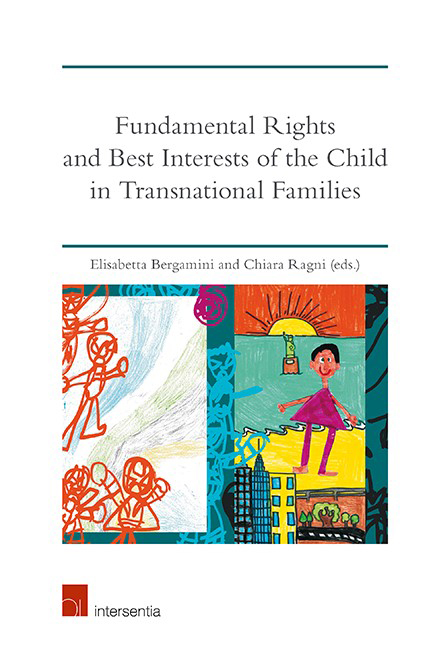Book contents
- Frontmatter
- Dedication
- Preface
- Acknowledgements
- Contents
- List of Cases
- List of Authors
- PART I THE IMPACT OF HUMAN RIGHTS AND OF THE BEST INTERESTS OF THE CHILD ON EU FREE MOVEMENT AND MIGRATION LAW
- PART II THE BEST INTERESTS OF THE CHILD AS A CONCERN OF HUMAN RIGHTS AND EUROPEAN PRIVATE INTERNATIONAL LAW
- The Place of Human Rights in the Private International Law of the Union in Family Matters
- The Best Interests of the Child Principle at the Intersection of Private International Law and Human Rights
- Recognition of a Foreign Status Filii: Pursuing the Best Interests Principle
- Surrogacy Arrangements and the Best Interests of the Child: The Case Law of the European Court of Human Rights
- Cross-Border Recognition of Adoption: Rethinking Private International Law from a Human Rights Perspective
- Protecting Children's Rights aft er Child Abduction: The Interaction of the CJEU and ECtHR in Interpreting Brussels II bis
- Cross-Border Parental Child Abduction in the EU: Is there Room for a Human Rights Exception?
- Impact of the Best Interests of the Child on the Brussels II ter Regulation
- Provisional Measures and the Best Interests of the Child in the Field of Parental Responsibility
- Index
- About the Editors
Cross-Border Parental Child Abduction in the EU: Is there Room for a Human Rights Exception?
from PART II - THE BEST INTERESTS OF THE CHILD AS A CONCERN OF HUMAN RIGHTS AND EUROPEAN PRIVATE INTERNATIONAL LAW
Published online by Cambridge University Press: 12 November 2019
- Frontmatter
- Dedication
- Preface
- Acknowledgements
- Contents
- List of Cases
- List of Authors
- PART I THE IMPACT OF HUMAN RIGHTS AND OF THE BEST INTERESTS OF THE CHILD ON EU FREE MOVEMENT AND MIGRATION LAW
- PART II THE BEST INTERESTS OF THE CHILD AS A CONCERN OF HUMAN RIGHTS AND EUROPEAN PRIVATE INTERNATIONAL LAW
- The Place of Human Rights in the Private International Law of the Union in Family Matters
- The Best Interests of the Child Principle at the Intersection of Private International Law and Human Rights
- Recognition of a Foreign Status Filii: Pursuing the Best Interests Principle
- Surrogacy Arrangements and the Best Interests of the Child: The Case Law of the European Court of Human Rights
- Cross-Border Recognition of Adoption: Rethinking Private International Law from a Human Rights Perspective
- Protecting Children's Rights aft er Child Abduction: The Interaction of the CJEU and ECtHR in Interpreting Brussels II bis
- Cross-Border Parental Child Abduction in the EU: Is there Room for a Human Rights Exception?
- Impact of the Best Interests of the Child on the Brussels II ter Regulation
- Provisional Measures and the Best Interests of the Child in the Field of Parental Responsibility
- Index
- About the Editors
Summary
ARTICLE 20 OF THE 1980 HAGUE CONVENTION: BETWEEN PUBLIC POLICY AND FUNDAMENTAL RIGHTS
Article 20 of the 1980 Hague Convention resembles a ghost – although it is the subject of many rumours, it is nowhere to be seen. Metaphor aside, the provision has stimulated strong debate and discussion ever since its drafting; however, its application has remained limited, thereby resulting in only marginal practical relevance. Nonetheless, the importance of this rule far exceeds the number of decisions that have been expressly determined by it. In a time characterised by the growing relevance of human rights and increasing violations of the same, the potential and the implicit effects of this rule outweigh the doubts and justify a short comment with regard to where we stand.
Article 20 of the 1980 Hague Convention provides for an additional reason to those listed in Article 12 for refusing the return of an abducted child, namely when such return
would not be permitted by the fundamental principles of the requested State relating to the protection of human rights and fundamental freedoms.
The drafting history of the provision calls for a strict interpretation of its scope of application. After a long debate, the rule was accepted only because the delegations refused to insert a public policy clause – a must-have provision at the time – and feared that this could lead some States to make reservations to the Convention.
Accordingly, the threshold for the operation of Article 20 should be higher than what would amount to a ‘simple’ public policy clause. As the Vera Perez Explanatory Report asserted, to trigger the provision and refuse return on this basis
it will be necessary to show that the fundamental principles of the requested State … do not permit it; it will not be sufficient to show merely that return is incompatible, even manifestly incompatible, with these principles.
Although the distinction between what is ‘not permitted’ by fundamental principles and what is ‘manifestly incompatible’ with those principles offers no clear guidance, situations that might be incompatible with the public policy of the requested State could nonetheless fall out of the scope of application of Article 20 and thereby not justify a refusal of return on such grounds.
- Type
- Chapter
- Information
- Publisher: IntersentiaPrint publication year: 2019



